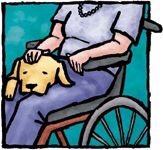ADA compliance
Make sure your goods and services are available to handicapped pet owners.
The Americans with Disabilities Act (ADA) requires that you remove architectural or communication barriers when this goal is "readily achievable." You'd likely make physical changes to comply with the ADA during a remodel, renovation, or new construction. If you own your facility, it's your responsibility to make changes. If you lease, you're responsible if your lease agreement gives you the right to make physical changes to the building.

When an individual's access is restricted, you must find ways to make your goods and services available through alternative methods. For example, if your historic landmark building isn't wheelchair accessible because of severe limitations on structural changes, you could arrange a house-call appointment or retrieve the animal from the client's vehicle and return it.
The key: Communicate with the client about his or her needs and preferences. If you can't meet the client's requests for special accommodation, contact an attorney or consultant knowledgeable in ADA issues for guidance.
Unlike many regulations, the ADA isn't enforced by a separate bureau or agency. If a person believes he or she was unlawfully denied access to your business because of a handicap, he or she would use the ADA as the basis for a lawsuit against you.
Although the ADA is federally mandated, state and local ordinances sometimes place additional requirements and restrictions on building and renovation projects. Obtain input from your architect and attorney at the planning phase of a project to ensure your practice complies.

Philip Seibert
For more, visit ada.gov. For guidance on a specific situation, consult an attorney versed in disability laws.
Philip Seibert, CVT, is an author, speaker, and consultant with Veterinary Practice Consultants in Calhoun, Tenn. Send questions or comments to ve@advanstar.com.